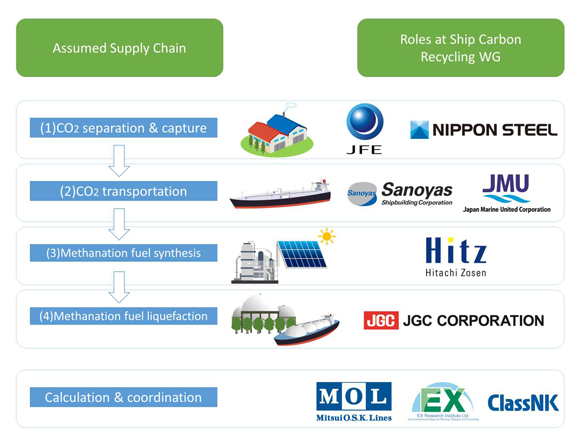Japanese Companies to Recycle CO2 Through the Methanation Technology
by Rudy P. SysAdmin at howtofindthemoneyNine Japanese companies including steel mills JFE Steel Corporation and Nippon Steel Corporation have formed a working group within Japan's Carbon Capture & Reuse Study Group to advance initiatives for zero-emission ship fuels through the use of methanation technology, a statement said July 16.
Other participants in the Ship Carbon Recycling working group include EX Research Institute Ltd., Hitachi Zosen Corporation, Japan Marine United Corporation, JGC Corporation, Mitsui O.S.K. Lines, Ltd., Nippon Kaiji Kyokai(ClassNK), and Sanoyas Shipbuilding Corporation.
The companies "plan to assume carbon recycling supply chain of methanation fuel that involves the supply of feedstock CO2, transportation of the feedstock, methanation, and conversion into marine fuel," the statement said.
Carbon recycling is a method used to capture and reuse emitted carbon dioxide and the steel firms plan to recycle carbon dioxide emitted from their manufacturing operations to produce synthetic methane.

The companies in the working group will calculate the estimated amount of CO2 emissions in the supply chain, and based on these results, identify technical challenges and develop a roadmap for its realization, it said.
The first stage of activities involve separation, capture and liquefaction of CO2 emitted from steelworks, transportation of liquefied CO2 by ship to a hydrogen supply site, generation of synthetic methane from CO2 and hydrogen by methanation reaction, and liquefaction of the synthetic methane and using it as marine fuel, it said.
In addition to obtaining an approximate value of CO2 emissions in this assumed supply chain, the group will also identify challenges and decide whether to proceed with subsequent next-stage activities along with the content of those activities, it said.
Focus on carbon footprint
The moves comes as environmental rules in international shipping are gaining increased attention.
The International Maritime Organization, in April 2018, laid out its strategy on greenhouse gas emissions, aiming to reduce the shipping industry's total GHG emissions by at least 50% from 2008 levels by 2050, and to reduce CO2 emissions per transport work by at least 40% by 2030.
On July 7, Shell together with Deloitte Netherlands and Deloitte UK published a joint research outlining global industry perspectives on decarbonizing the shipping sector.
According to the report, 95% of shipping executives interviewed worldwide viewed decarbonization as important, or a top-three priority, and nearly 80% noted that its importance had increased significantly over the past 18 months.
"While shipping leaders are rightly focused on the current challenges of the COVID-19 pandemic, our research shows that they still have their sights on the horizon and identify decarbonizing shipping as a top priority," Grahaeme Henderson, vice president Shell Shipping & Maritime, said in a statement then.
The 10 largest coal producers and exporters in Indonesia:
Source: SP Global
Sponsor Ads
Created on Jul 18th 2020 03:01. Viewed 642 times.
Comments
No comment, be the first to comment.



